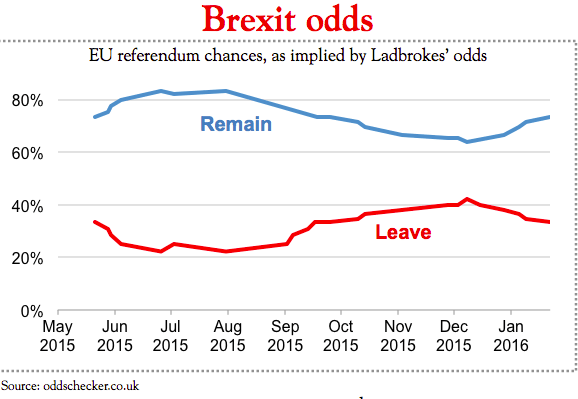Why is David Cameron having such trouble persuading Jean-Claude Juncker to give in to his minimal demands for EU reform? The Prime Minister pledged, in a Tory manifesto, to restrict welfare for migrants for the first four years they’re in Britain: not as an ‘emergency’, but as a matter of routine. He was returned with a majority, and under British democracy this means it ought to happen. If the Lords were to try to frustrate this, the PM would overrule them because it was a manifesto pledge, voted on by the public. Why accept a veto from the EU?
But the polls show a clear lead for ‘in’ – a ComRes poll for the Daily Mail tomorrow shows in leading by 18 points (54pc to 36pc) with just 10pc as ‘don’t knows’. The gap has narrowed since ComRes asked the same question last month – unusual for a referendum campaign, where the status quo normally expands its lead. But seen from Brussels (which ignores referenda if they go the wrong way) things look pretty safe.
Juncker knows that Cameron will take what he’s given and lead the ‘remain’ campaign no matter what. So he’s saying he’ll only accept the Tory manifesto pledge in ’emergency’ conditions – which would never arise. Cameron wants to get immigration to the “tens of thousands” yet net immigration is now over 300,000. If that doesn’t count as an emergency, then nothing will.
Cameron has weakened his hand by making his preference for ‘in’ so clear. He has even started the campaign; Tory MP Nick Herbert has been sent into action with his ‘In’ campaign, not even waiting for Cameron’s negotiations. To be sure, Cameron is winning the argument inside his Cabinet: right now it looks like Priti Patel will be the only undecided minister to back ‘out’ – joining those (Theresa Villiers, Iain Duncan Smith, Chris Grayling) whose views are already well-known. I don’t expect any other Cabinet member to break for out. And not because the EU is looking very attractive: it’s because Westminster is looking attractive.
The Tories know that if they can stop tearing themselves apart over this, the next 10 years—perhaps 15 years—will be theirs. And this is providing a greater pull than the desire to sort out Europe, especially to ministers who believe the best years of their career are ahead of them.
And also, as the above graph shows, the betting markets are pointing to an ‘in’ verdict. According to Ladbrokes odds, there’s now a 69 per cent chance of an ‘in’ vote and 31 per cent chance of an ‘out’ vote.
So if you were Jean-Claude Juncker, would you give Cameron a good deal? The Prime Minister has already made his choice – and nothing Juncker says will change that. Which is a shame, because if Cameron had a bit more patience then he would have a far stronger negotiating hand.







Comments